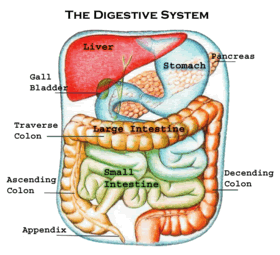In order to carry out the processes that keep your body alive, your body needs to be fed (given fuel). Thus, your body is in a continual state of hunger which can be quickly relieved by eating. Having food present in your GI tract neutralizes the feeling of hunger which helps you to feel calm both physically and emotionally. Once your body metabolizes this food and utilizes it to carry out the functions that it needs to survive, you feel hungry again and it’s time to eat. Simple. But not really, right?
If hunger were such a basic biological process, then no one with access to food would ever starve or overeat, right? Well clearly that’s not the case. Somehow, along the way, when food became plentiful and a doctrine of thin became dictatorially pervasive, our minds and bodies began to disagree on what we should eat and how much we should eat.
We have more access to food and we have more rules about what our bodies are supposed to look like. Food is everywhere, it’s advertised all over the place, but so are promises of an ultra thin body if you follow this one diet- the very last diet you will ever need. It’s not uncommon to be watching TV when a commercial for the Olive Garden’s never ending pasta bowl comes on followed by and advertisement for NutriSystem. Wait. What? It’s kind of insane. It’s like the media wants us to have eating disorders because it’s the only way all sides win. EAT! EAT! EAT! STARVE! STARVE! STARVE! EAT! EAT! EAT! STARVE! STARVE! STARVE! EAT! EAT! EAT! STARVE! STARVE! STARVE! EAT! EAT! EAT! STARVE! STARVE! STARVE!
It’s incredibly confusing and messes with our ability to understand what we need or don’t need physically.
No wonder our cues for hunger and satiety are so out of wack. We are told at some young age that we need to lose weight and so we begin to deny our hunger. Then, of course we binge because we are biologically predisposed to overeat after times of restriction to keep our physiological processes going. This is a survival mechanism, just in case we are restricted food again, we must binge to stay alive. But then, our neurosis kicks in, full of guilt, full of shame, full of anxiety, and we either start some kind of new diet to gain some control (thus denying our hunger which ultimately backfires) or we eat compulsively to stuff the feelings of stress and anxiety.
We begin to confuse real physiological hunger with cravings or we begin to deny our hunger and confuse the feeling of hunger with virtuosity, self control and willpower.
When you don’t eat enough, your body begins to shut down. You become tired. Your body tries to conserve what it has to carry out basic functions such as respiration. When you go long periods of time without eating, your organs shut down and you die. This is what happens with anorexia and unintentional starvation.
When you eat more than your body needs, you are overloaded with energy and your body has to work extra hard to process that food. This is why people often feel sluggish and tired the day after a binge. For you biology nerds out there, check out this more in depth piece on the pathophysiology of digestion.
But so how do you know if you’re hungry or not?
1.)When you think that you are hungry, ask yourself how you know that you’re hungry before you eat anything. Sometimes people think they’re physically hungry, but they’re actually bored, procrastinating, tired, anxious, lonely, angry, stressed, sad, happy or thirsty.
2.)Check in with your physical cues for hunger. These signs might be your stomach growling, pain in your stomach, a feeling of emptiness, a lack of energy, fogginess, lack of concentration, headache, dizziness, obsessing about food, or other feelings. Your body will let you know when it is ready for more food.
3.)If you are not having any physical cues of hunger, see if you can wait 10-15 minutes and do something else. Set a timer and walk around the block. If you are still obsessing on food, think about what it is that you actually need. Sometimes it’s easier to just eat than to deal with the real issue at hand. Food is always there if you need it, but push yourself a little bit to tend to your other needs. Eating can be a way of neglecting our other needs.
4.)Don’t neglect your body if you are hungry. Feed yourself.
The hunger and satiety scale can be helpful here. This is a scale that helps you to relearn your hunger.
Hunger & Satiety Scale
0- Beyond Hunger
At this point, you have denied your hunger for so long that you don’t even have any symptoms of hunger. Your body is in starvation mode. Your metabolism is slowing down. You probably feel low energy, tired, and empty.
1- Ravenous
At this point you feel like you’re starving. Your body is just looking for nutrients before it shuts down and you begin running on adrenaline. This is this place where many people binge. Your body needs food now and will eat as much as it possibly can to get the nutrients it needs to run without you having the power to intervene.
2- Very Hungry
You are thinking about food a great deal now, unable to focus on work or conversations.
3- Hungry
You notice that your stomach might be beginning to growl, you begin to lose your focus a bit, you are becoming distracted easily.
4- Almost Hungry
This is when your first thoughts of food begin, or, if while you are eating, you stop too soon, still feeling as though you need more food.
5- Neutral
At this point, you don’t feel hungry, nor do you feel full. You are not fixated or even thinking about food. You are able to be productive and focus on work or conversation.
6- Satisfied
You have eaten enough to feel content. You have fed yourself what your body needs. You are no longer hungry, yet you are not feeling too full. You are able to stop eating at this moment if you want.
7- Slightly Full
You are a little more than satisfied, you aware of the feeling of food in your stomach, possibly feeling as though you’ve had a few bites too many.
8- Very Full
You are feeling your belly pushing out, you feel like you’ve had too much.
9- Uncomfortably Full
Your body feels uncomfortable. You just want to go to sleep at this point. You might be feeling depressed or regretful.
10-Completely Stuffed
At this point, you feel like you might throw up. You have eaten so much that you are in pain. Your belly hurts and you can’t focus on anything else.
_________________________________________________________________________________________
When using the hunger and satiety scale, you should try not to let yourself get lower than a 3 or higher than a 7. Meals and snacks should be slow and mindful to allow you to understand what your body needs.
It’s not easy to get this after spending years dieting, restricting, bingeing or comfort eating. I suggest starting by checking in with yourself a few times a day. Am I hungry? Where am I on the hunger and satiety scale? When you find that you are at a 4, you know that you are going to need a snack fairly soon.
And then, at meal times, before you eat, ask yourself where you are on the scale. If you consistently notice that you are at a 2 or lower when you begin your meals, you are waiting too long to eat. This can of course lead to bingeing because your survival instincts are kicking in and storing up food for the next starvation cycle.
When you are halfway through, put your fork down and ask yourself again. If you are at a 5-6, try and put your food away for a couple of hours then let yourself return to it rather than finishing everything on your plate. This is to help you remember that you do have more food coming to you when you need it and that you don’t have to compulsively eat what’s in front of you.
As you begin to understand what you personally need, you are able to take care of yourself better. There is no set time for how long you should wait between meals. We are not all built to scale. We are different sizes, different shapes and have different structures, and thus different needs. Some people need to eat every 2 hours, some people can go longer periods of time without eating. Find out what you need, don’t look to someone else’s plan to tell you.
Online Binge Eating Treatment - LEARN MORE!
EVIDENCE BASED INTERVENTIONS THAT REWIRE YOUR BRAIN TO:
-
STOP BINGE EATING
-
AUTOMATICALLY MAKE HEALTHY CHOICES
-
GAIN A FEELING OF PEACE AND CALMNESS IN YOUR BODY
-
RECOVER FROM BINGE EATING FOR GOOD




 Follow
Follow
